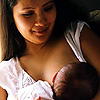UCSF Recognizes World Breastfeeding Week

The CoE and WHRC have been committed to supporting nursing mothers in their efforts to continue to breastfeed after returning to work. For the past eight years, they have administered the employee lactation breastfeeding program. Rooms throughout the UCSF campuses are designated as official breastfeeding zones where mothers can comfortably express milk in privacy using hospital-grade breast pumps. "The breastfeeding stations benefit UCSF students, staff and faculty, and are one of the ways in which the Center of Excellence promotes a supportive and family-friendly work-life environment," said Nancy Milliken, MD, director of the CoE. "The work of Diane Wara, MD, and the Chancellor's Advisory Committee on Child Care; Alma Sisco-Smith and the Work~Life Resource Center; Patricia Robertson, MD, and the Breastfeeding Task Force; and Stella Hsu, associate vice chancellor of Campus Life Services, has been very important to the breastfeeding initiative at UCSF." Some 35 women at UCSF use these private rooms two to three times per day across Parnassus, Mount Zion and at Laurel Heights locations. Statistics on usage at Mission Bay are not yet available, as the rooms were just recently established. "All of the rooms are comfortable and, most importantly, private," said Laffey. "Here at the WHRC, the lactation room has a special chair called the 'breastfeeding glider.' It is a comfortable recliner that rocks back and forth, and has been quite popular with the moms." With more than 50 percent of all mothers with infants active in today's workplace, working mothers who breastfeed face unique challenges. Support has been growing throughout the world to enable mothers to breastfeed without stigma in the workplace. Following a statewide mandate enacted in 2001, California employers are required to provide accommodations for breastfeeding mothers, as well as break time to allow employees to pump in private. "Employers can provide work site support by establishing lactation rooms for mothers who return from maternity leave," said Dixie Horning, executive director for the CoE. "Not only will new moms benefit from the support within their workplace, but the employer will also benefit. Employers will see an increase in productivity, since onsite rooms give women options other than traveling back home during the workday." The CoE WHRC is one of 16 community-based demonstration projects (CDPs) throughout the United States working with the DHHS, Office on Women's Health to promote breastfeeding awareness on a local level. The CDPs, which include breastfeeding coalitions, hospitals, universities and other organizations, were funded to offer breastfeeding services, provide outreach to their communities, train health care providers on breastfeeding and track breastfeeding rates in their community. The CoE WHRC also offers a convenient on-site retail facility for purchasing lactation supplies, such as nursing bras, nursing pads and hands-free pumping accessories. In addition, there are book and video resources, as well as a continuum of classes and workshops. For more information on World Breastfeeding Week, visit the website.
| UCSF
Breastfeeding Stations
UCSF's Women's Health Resource Center provides breastfeeding stations for employees and students at the following campus locations:
San Francisco General Hospital also has a special room set aside for employees who work there. Contact Martha Dominguez at 415/206-6719 for more information. |